If you're willing to dive into the mess and chaos, baking with toddlers is an experience for growth - for you and for them! In the cozy corners of our kitchens, amidst the flour dusted countertops and the warm glow of the oven, lies an extraordinary classroom for our littlest learners. Baking with toddlers is not just about whisking eggs and measuring flour; it's a heartfelt blend of joy, exploration, and education. Along the way, you might just find some room to grow in your own heart...
In this blog post, we'll dive into the delightful world of baking with toddlers, exploring age-appropriate activities, the developmental benefits they gain, and simple yet engaging ways to include them in the baking process.
Note: As an Amazon Associate, I earn from qualifying purchases.
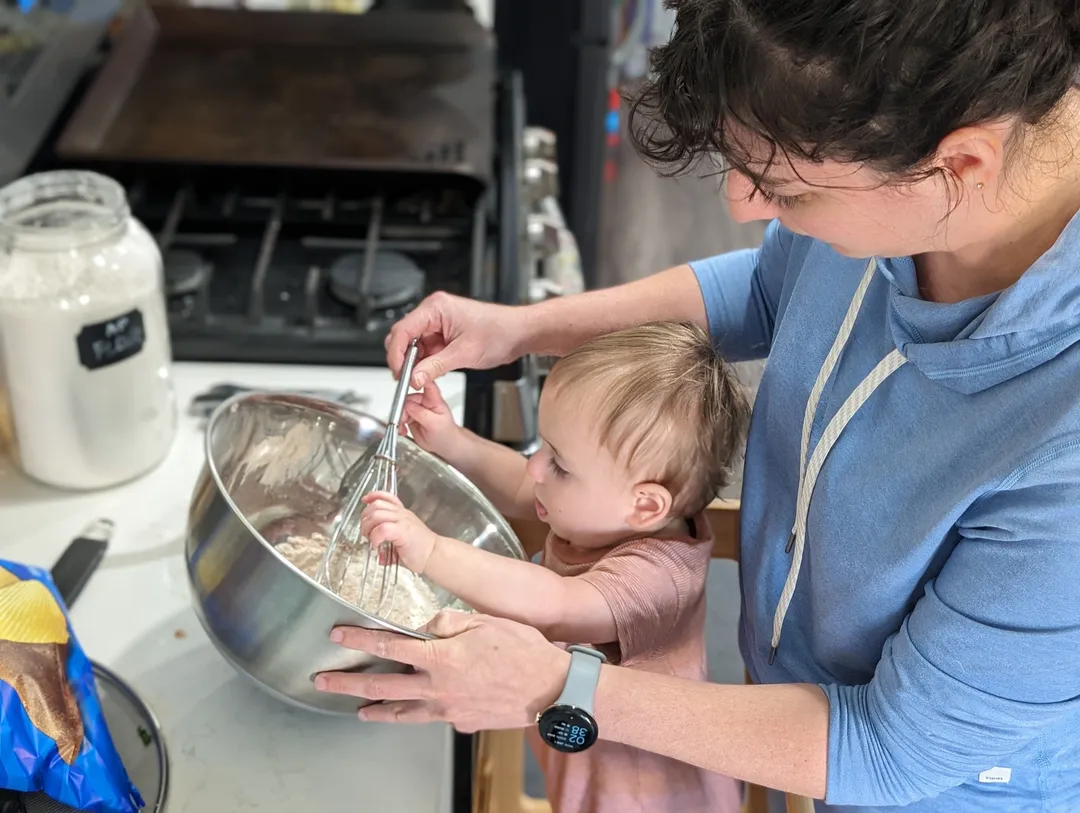
The Joy of Baking Together
Baking offers a unique, multi-sensory experience that is perfectly suited to the curious and explorative nature of toddlers. It's a hands-on activity that not only delights their senses but also fosters a myriad of developmental benefits. From the tactile joy of kneading dough to the olfactory pleasure of smelling freshly baked cookies, baking can be a source of endless fascination for young children.
I've been including Hayes in the kitchen since his first birthday, doing my best to get him comfortable in the room, with the tools, and all the different sensations that come with a working kitchen.
One of the best ways we do that is with our learning tower. At 13.5 months, Hayes was able to get up and down on his own safely so a whole new world - the kitchen counter - was opened up to him. It prompted more toddler-proofing for us but ultimately has been really great for Hayes's developing toddler self-help skills and independence. If you don't have one of these already, I HIGHLY recommend one for safe and easy baking with your toddler!
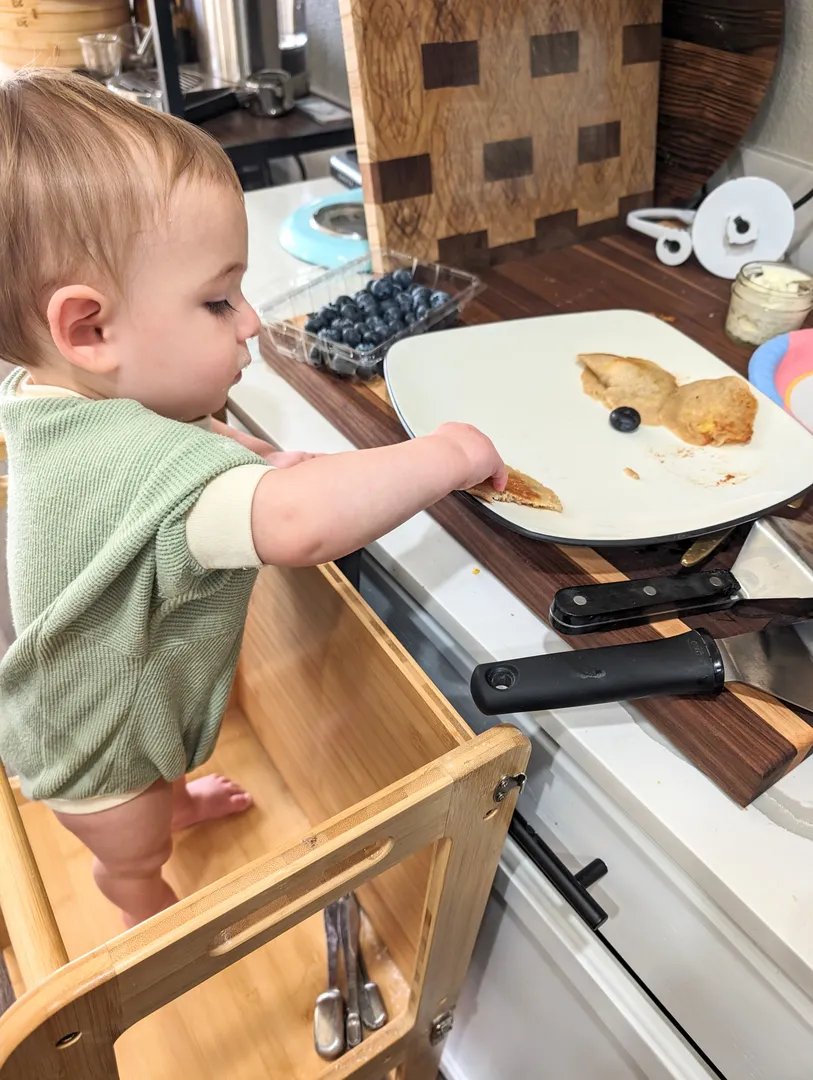
Age-Appropriate Kitchen Tasks
So how can your littlest hippo help? Whether cooking or baking, involving toddlers in the kitchen requires a bit of creativity and patience, but the rewards are well worth the effort. Obviously, every kiddo is going to be at different stages developmentally and you know your kid best. Here's a guideline to how you can tailor baking activities to suit the developmental stages of your little ones:
For the Littlest Chefs (1 Year+)
- Sensory Play: Let them explore the textures of safe, non-toxic ingredients like flour and water.
- Stirring Together: With your help, they can stir ingredients, enjoying the motion and the mixture.
Toddlers Taking Charge (2 Years+)
- Pouring Ingredients: They can pour pre-measured ingredients into a bowl, practicing their hand-eye coordination.
- Washing Produce: Under supervision, toddlers can wash fruits or vegetables, introducing them to the concept of cleanliness in food preparation.
- Using Kid-safe Tools: Somewhere around 2.5 and under your watchful eyes, your toddler might be ready to start using kid-safe tools like knives and crinkle cutters. We have this set and have already started (carefully) introducing Hayes to them - it's been a hit!
Little Bakers in Training (3 Years+)
- Mixing and Matching: They can mix ingredients with guidance, learning about the transformation that occurs when different elements combine.
- Shaping Dough: Simple tasks like forming shapes or using cookie cutters allow them to express their creativity.
Pre-School Pâtissiers (4 Years+)
- Measuring Mastery: Introduce them to measuring cups and spoons, laying the groundwork for math skills.
- Egg-cellent Adventures: With close supervision, they can try cracking eggs, a task that teaches them about gentleness and precision.
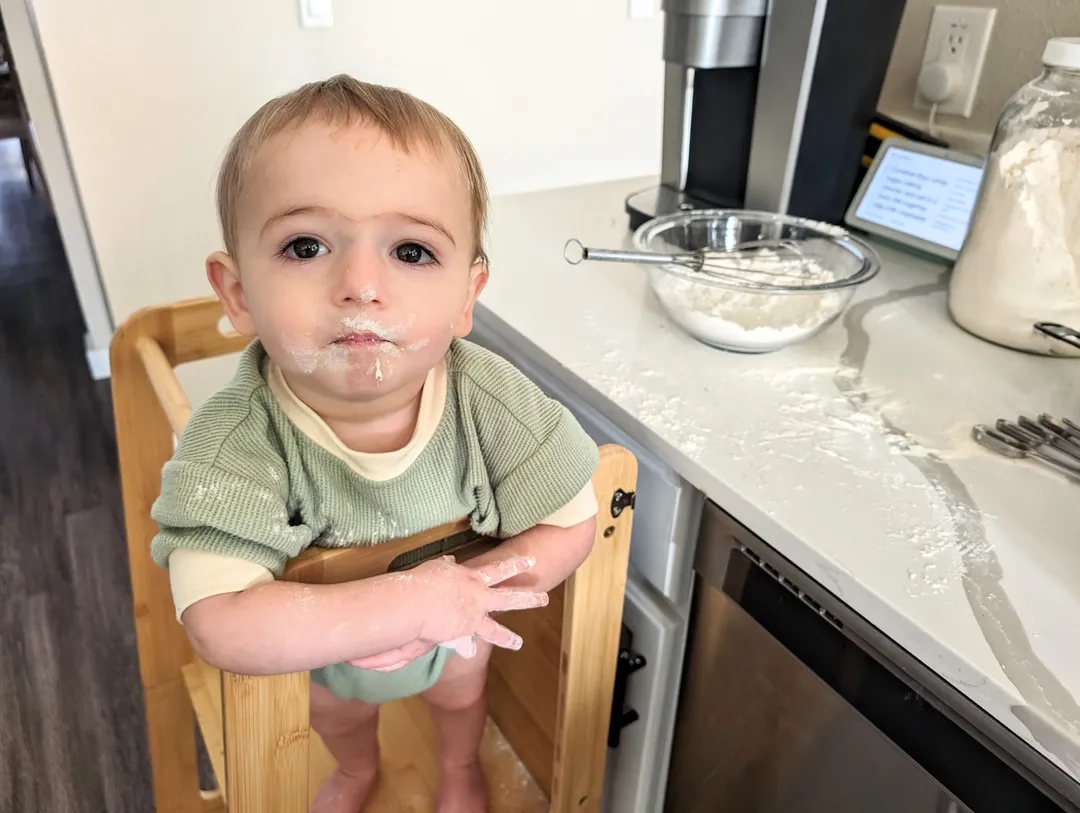
The Recipe for Development
Baking with toddlers is not just fun; it's filled with educational opportunities that promote cognitive development, fine motor skills, and emotional growth. The Montessori method of early childhood education, developed by Dr. Maria Montessori, emphasizes independence, freedom within limits, and respect for a child’s natural psychological, physical, and social development. As part of the Montessori approach, practical life activities, including kitchen and baking tasks, play a crucial role in a child's early development. Here's how:
Cognitive Development
Baking introduces toddlers to basic concepts of math and science in a tangible way. Measuring ingredients, counting eggs, or observing the chemical reactions of baking soda are all lessons in disguise, enhancing their understanding of the world around them.
Emphasis on Practical Life Skills
Activities like baking and assisting in the kitchen are considered essential for developing foundational learning skills. They offer real-life tasks that are directly applicable to the child's world, promoting a sense of independence and self-sufficiency.
Fine Motor Skills and Coordination
Kitchen tasks such as stirring, pouring, measuring, and cutting (with child-safe tools) are excellent for refining fine motor skills and hand-eye coordination. These activities strengthen hand muscles and improve coordination, which are crucial for writing and other daily tasks.
Independence, Confidence, and Responsibility
As toddlers take on tasks in the kitchen, they develop a sense of independence and self-efficacy. They learn to follow steps, solve problems, and complete a task from start to finish. This nurtures a sense of responsibility and achievement and completing a task, no matter how small, boosts their confidence and encourages them to try new challenges.
Sensory Exploration
Baking and kitchen activities are rich in sensory experiences. Montessori values the role of the senses in learning and development. Through touching different textures, smelling various ingredients, and tasting their creations, children enhance their sensory skills and learn to differentiate and appreciate subtle differences.
Language and Mathematical Skills
Baking is a conversation-rich activity. As you describe what you're doing, ask questions, and give instructions, your toddler's vocabulary and comprehension skills grow. The kitchen is also a natural environment for learning mathematical concepts like counting, measuring, sequencing, and understanding fractions.
Emotional and Social Development
Baking together fosters patience, cooperation, and turn-taking. It's also a comforting activity that can help toddlers express themselves and feel valued as part of the family. Working together on a baking project teaches children about cooperation, sharing, and the joy of working towards a common goal. It also instills respect for communal spaces and the importance of cleaning up after themselves.
Cultivating Patience and Concentration
The process of baking—from gathering ingredients to waiting for the final product to come out of the oven—requires patience and concentration. These are key traits that require development in children (and adults).
Integration with Cultural and Scientific Learning
Finally, involving toddlers in baking and kitchen tasks helps them make connections between the food we eat, where it comes from, and the chemical processes that occur during cooking and baking. This holistic approach ensures that children appreciate the interconnectedness of life and knowledge and forms the foundations for continued scientific learning.
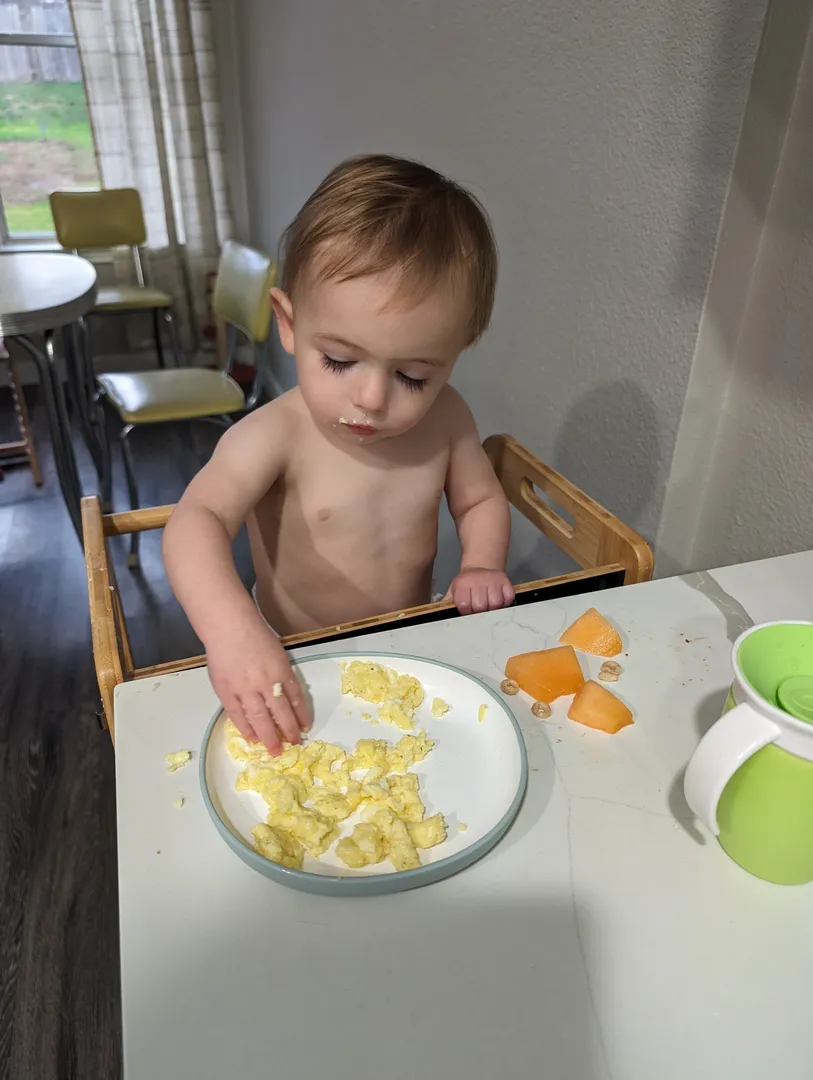
Easy Baking Activities to Get Started
Are you inspired and ready to don your aprons and dive in? Here are a few simple baking tasks to get you and your toddler started:
- Decorate Your Own Pizza: Use pre-made pizza dough and let your toddler add their favorite toppings.
- No-Bake Energy Bites: Combine oats, peanut butter, and honey, then roll into balls. It's mess-free and doesn't require an oven.
- Cookie Cutter Sandwiches: Make sandwiches and use cookie cutters to create fun shapes. It's a simple way to introduce them to the concept of baking and decorating.
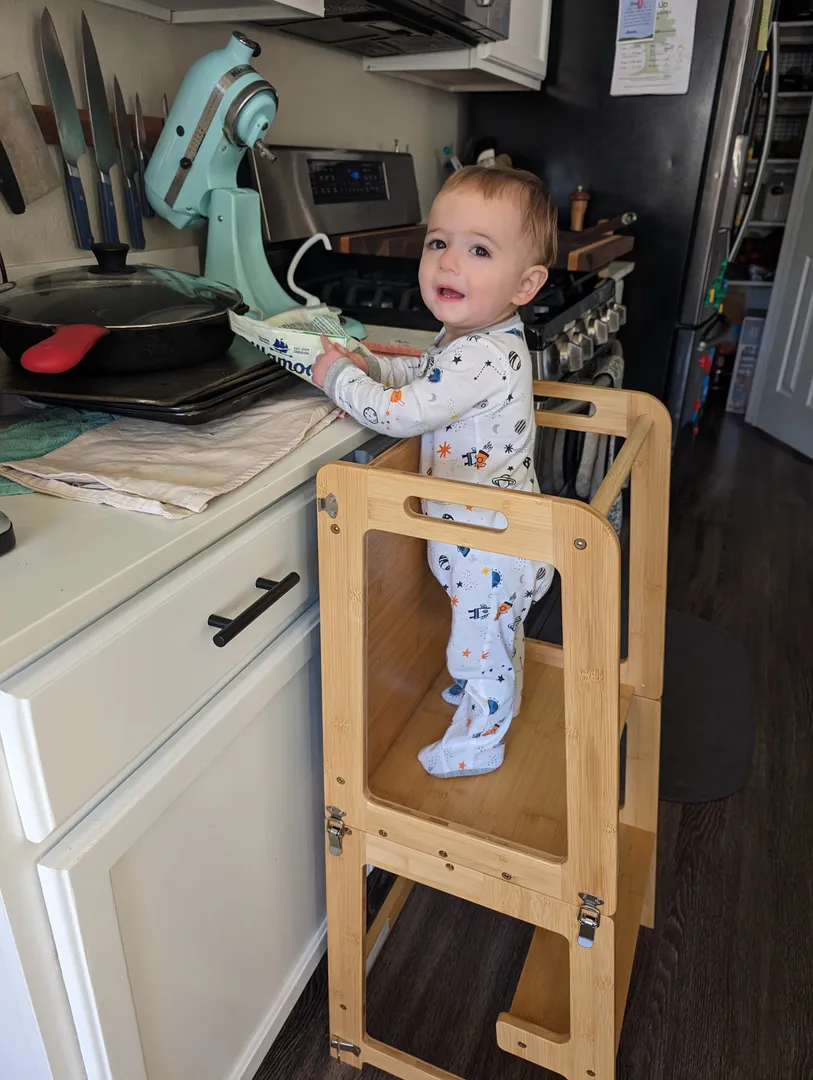
Tips for a Smooth Baking Experience
Remember when I mentioned you might grow in the process of baking with your toddler? While fun, including them in the kitchen is not without it's fair share of challenges. Here are a few tips to help you keep your calm and create a smooth (or as smooth as possible) baking experience with your kiddo:
- Prepare in Advance: Have ingredients measured and tools ready to keep the process smooth.
- Embrace the Mess: Accept that baking with toddlers will be messy. It's part of the fun and learning.
- Safety First: Always supervise closely and keep hazardous items out of reach.
Baking with toddlers is an enriching experience that goes beyond just making delicious treats. It's about spending quality time together, learning, and creating lasting memories. Including Hayes in the kitchen has been one of my favorite parts of every day and I hope this inspires you to open up opportunities for more toddler baking and cooking in your routine too!
So, grab a bowl, a spoon, and your little one, and let the baking adventures begin!